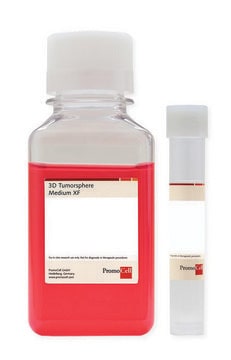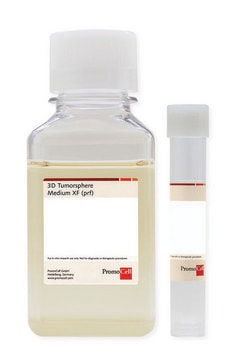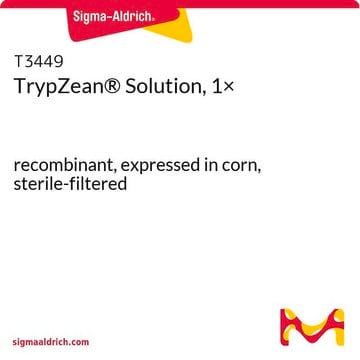C-28081
Primary Cancer Culture System
250 ml
Synonym(s):
Primary tumor cell culture
About This Item
Recommended Products
packaging
pkg of 250 ml
technique(s)
cell culture | mammalian: suitable
shipped in
wet ice
General description
Application
Features and Benefits
Successfully prevent stroma overgrowth when isolating fresh tumor samples
Establish a culture of pure malignant cells within 4-6 weeks
Culture PDX tumor models in vitro
Defined and animal component-free formulation
Components
SupplementMix for 250ml
NCCD surface treatment reagent, 2ml
Note: The NCCD Reagent is intended for treatment of the culture surface. Do not add the NCCD Reagent to the medium.
Quality
Storage and Stability
Subculture Routine
Storage Class Code
10 - Combustible liquids
Certificates of Analysis (COA)
Search for Certificates of Analysis (COA) by entering the products Lot/Batch Number. Lot and Batch Numbers can be found on a product’s label following the words ‘Lot’ or ‘Batch’.
Already Own This Product?
Find documentation for the products that you have recently purchased in the Document Library.
Related Content
The PromoCell Primary Cancer Culture System allows selective isolation of malignant cancer cells from tumor associated stromal cells in patient derived xenographs (PDX models) and tumor samples.
The PromoCell Primary Cancer Culture System allows selective isolation of malignant cancer cells from tumor associated stromal cells in patient derived xenographs (PDX models) and tumor samples.
The PromoCell Primary Cancer Culture System allows selective isolation of malignant cancer cells from tumor associated stromal cells in patient derived xenographs (PDX models) and tumor samples.
The PromoCell Primary Cancer Culture System allows selective isolation of malignant cancer cells from tumor associated stromal cells in patient derived xenographs (PDX models) and tumor samples.
Our team of scientists has experience in all areas of research including Life Science, Material Science, Chemical Synthesis, Chromatography, Analytical and many others.
Contact Technical Service







